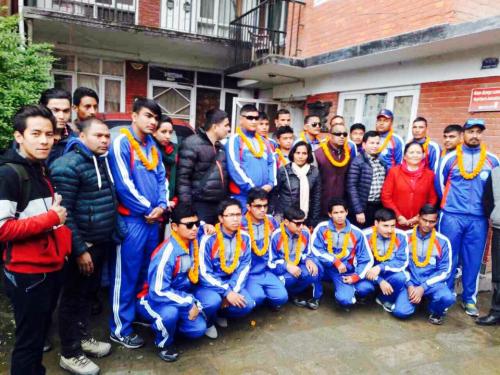
Nepal might not have won the T20 Blind Cricket World Cup that was recently held in India but there is no doubt that its national team, under the leadership of National Army Major Pawan Ghimire, broke new ground with victories over two major nations like South Africa and New Zealand.
While the way national media coverage of the event was encouraging, certainly there are wide margins for our news outlets to be more involved or better “engaged” in covering such important events.
Indeed, Pawan had to face multiple challenges to make sure that the country could be represented in the World Cup: from lack of funding, to lack of adequate training ground and a general apathy towards adaptive sports in the country.
Yet here we are today celebrating an overall success story not only for the members of disability community but for the entire Nepal.
After all here we have an incredible story on how adaptive sports can unify the country, bringing persons without disabilities to better understand and respect the athletic qualities of citizens living with disabilities.
Perhaps, also thanks to sports playing, we are at the beginning of a new era of inclusive nation building where persons with disabilities will play a critical role in the national development.
Heroes like Major Ghimire are not only the pioneers of adaptive sports in the country but should be also considered the trailblazers for a more inclusive society.
I believe this tectonic shift towards justice can happen only if two key elements are at interplay.
On the one hand, we have a combination of reliance, determination and positive restlessness, the attitude that do not let you stay quiet and silence when injustices, like the one faced by persons with disabilities, occur on daily basis like here in Nepal.
These attributes are driven by a larger goal, making the society more inclusive and just.
I would define this hodgepodge of qualities as “strategic grit”, the skill of not quitting in face of adversities that give the strength to pursue your goals.
Since the day Pawan lost his sight during an ambush during the civil conflict, we have here an extraordinary example of incredible endurance matched by high professionalism.
The other and complementary element is “partnership creation” because Nepal could be represented at the World Cup only thanks to a coalition of actors, private corporate houses, smart foreign aid and local not for profit and many individual citizens all coming together.
Pawan was able to put together an incredible “dream team” of supporters and each of them deserved to be mentioned.
From the private sector, we had the involvement of MEGA Bank that partially covered the costs of uniforms while Four Seasons Tours and Travels, strategically focusing on inclusive tourism as a social business, contributed with the track suits.
Annal Jyoti Foundation founded by Ms Jyoti KC who is very involved in the disability sector, played also an important contribution with the uniforms.
The Indian and Australian embassies providing general support for the preparation of the world cup, including taking care of the costs related to the selection of the players.
CBM, a leading INGO working in Nepal since many years in the field of disability, stepped in to cover the costs of uniforms, cricket kits and shoes.
The Cricket Association for the Blind in India also helped ensuring the participation of Nepal to the competition by covering some of the air fares.
Last but not the least, the national blind cricket team could count on the Ministry of Youths and Sport to cover the remaining costs of the travel and the lodging of the athletes during the preparation phase.
The National Sport Journalist Forum also played a very important part of the coalition, helping disseminating news related the games and hosting the press conference.
As mentioned before, it was not easy for Major Pawan and its dedicated team at the Cricket Association of the Blinds, CAB, to come up with this incredible list of partnerships but somehow, almost magically, they put together a fantastic puzzle of partnerships.
Hopefully other corporate houses will take note of the achievements of the national blind cricket team and slowly a more conducive environment to support adaptive sports will be created.
After all here, be it blind cricket, wheelchair basketball or wheelchair cricket, boccia, tennis table or swimming, we are talking about sports played at the highest level by real athletes.
We do not want to motivate corporate houses towards “compassionate” corporate responsibility but rather to invest in development of the national sports.
After all, major multinationals like Samsung and BMW and Toyota have been active in supporting para athletes worldwide.
I am sure the day will come when Major Ghimire and CAB will find it easier to train in a proper ground and sustain their institutional activities on daily basis because the preparations for the next world cup starts today.










Add new comment